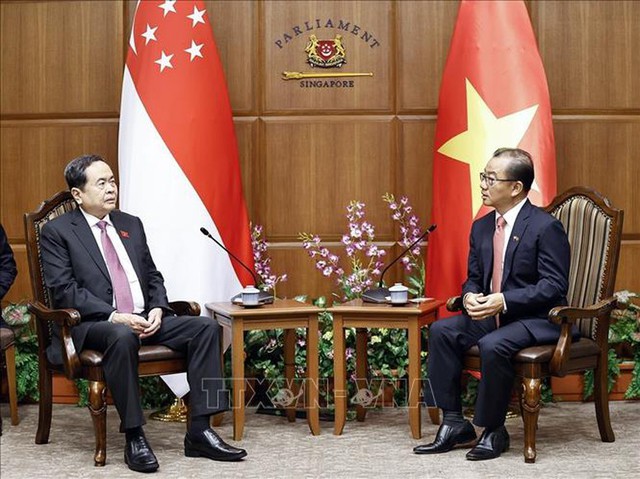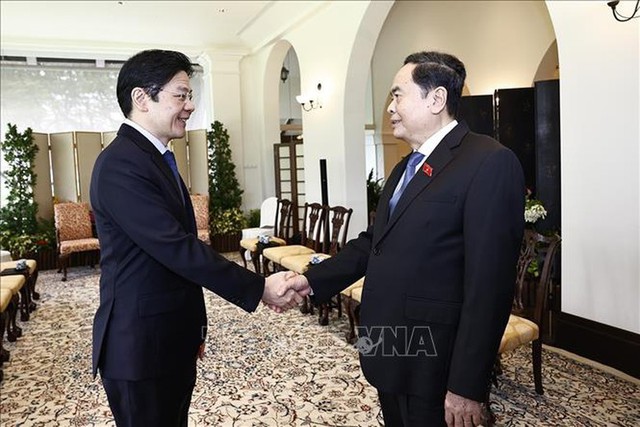Top Vietnamese legislator meets with top Singaporean leaders
VGP - Chairman of the National Assembly Tran Thanh Man held talks with his Singaporean counterpart Seah Kian Peng and had a meeting with Singaporean Prime Minister Lawrence Wong on December 2, as part of his official visit to Singapore.

Chairman of the National Assembly Tran Thanh Man (L) holds talks with his Singaporean counterpart Seah Kian Peng, Singapore, December 2, 2024 - Photo: VNA
During the talks between the two top legislators, Tran reiterated that Viet Nam consistently considers Singapore as a partner of top importance in the region, calling for Singapore's further support for Viet Nam's strategic personnel development.
He suggested the Singaporean parliament issue policies to create favorable conditions for Vietnamese enterprises and nationals to do business, work and study in the country, contributing to advancing the bilateral relations.
He invited Peng and his spouse to visit Viet Nam in the near future, and the latter accepted the invitation with pleasure.
Both sides engaged in profound discussions about major orientations and measures to strengthen bilateral cooperation and elevate the relations in the time to come.
They noted that economic and trade cooperation is a crucial pillar of the bilateral relations, stressing the need to create favorable legal frameworks and accelerate the oversight of the implementation of signed agreements and deals, particularly those in fields of green economy, digital economy, clean energy, cybersecurity and innovation.
Both sides vowed to speed up collaboration in traditional areas such as infrastructure development, tourism, and people-to-people exchange.
Regarding security and defense cooperation, both sides agreed that there are ample room to bolster cooperation, particularly in enhancing dialogues and exchanges between their navy, army and air forces, cybersecurity collaboration, and maritime environmental protection via the use of new technologies.
They pledged to effectively implement bilateral cooperation agreements between the two parliaments to lift the Viet Nam–Singapore Strategic Partnership to a new height.
The two legislators emphasized the need to strengthen information and experience sharing in all spheres of the completion of the institutions, policies and legal system, ensuring macroeconomic stability and enhancing the efficiency of international integration.
They concurred to foster stronger ties and support each other at multilateral forums such as the Inter-Parliamentary Union (IPU), the Asia–Pacific Parliamentary Forum (APPF), the ASEAN Inter-Parliamentary Assembly (AIPA), the UN, and mechanisms led by ASEAN, contributing to improving their positions and prestige in the region and the world.
They shared a similar viewpoint on building and maintaining a peaceful and stable environment for development in the Asia–Pacific region.
Both sides vowed to maintain and ensure security and safety of navigation and aviation in the East Sea, and peacefully settle disputes based on international law, including the 1982 UN Convention on the Law of the Sea (UNCLOS).

Chairman of the National Assembly Tran Thanh Man (R) meets Singaporean Prime Minister Lawrence Wong, Singapore, December 2, 2024 - Photo: VNA
At the meeting between the top Vietnamese legislator and the Singaporean Prime Minister, Wong welcomed Tran on his first official visit to Singapore in his new role, expressing his belief that the visit would set key orientations to further strengthen bilateral ties in the near future.
Tran, for his part, expressed his belief that in his role as Secretary-General of the People's Action Party, Wong would lead Singapore to obtain greater socio-economic achievements, particularly through the "Forward Singapore" agenda, thereby elevating Singapore's standing on the global and regional arena.
Both sides vowed to continue working closely to upgrade the bilateral ties to a new height.
They hailed Singapore's position as the second largest foreign investor in Viet Nam, with over 3,800 projects worth over US$81 billion, adding that a network of 18 Viet Nam-Singapore Industrial Parks (VSIPs) across 13 Vietnamese localites has become a hallmark of their successful economic cooperation.
The two leaders highlighted the need to make breakthroughs in such areas as green logistics, data centers, semiconductor, clean energy, carbon credit, food security and green finance, were also highlighted.
The host and the guest consented to expand defence-security cooperation towards a more practical and effective manner as well as explore the possibility to enhance collaboration in other key areas such as education-training, culture, and people-to-people exchanges.
Regaridng global and regional issues of shared concern, both sides pledged to continue mutual support at multilateral forums and organizations, maintain ASEAN's solidarity and central role in strategic issues impacting the security and development of the ASEAN Community and the broader region, including the East Sea issue./.
